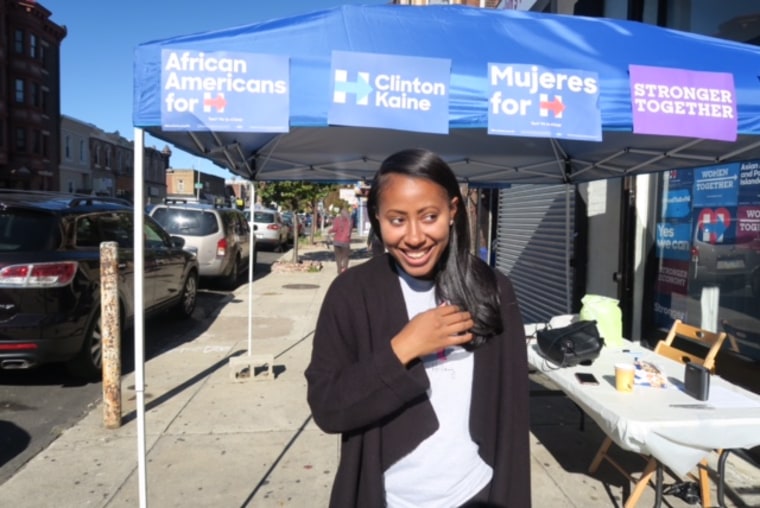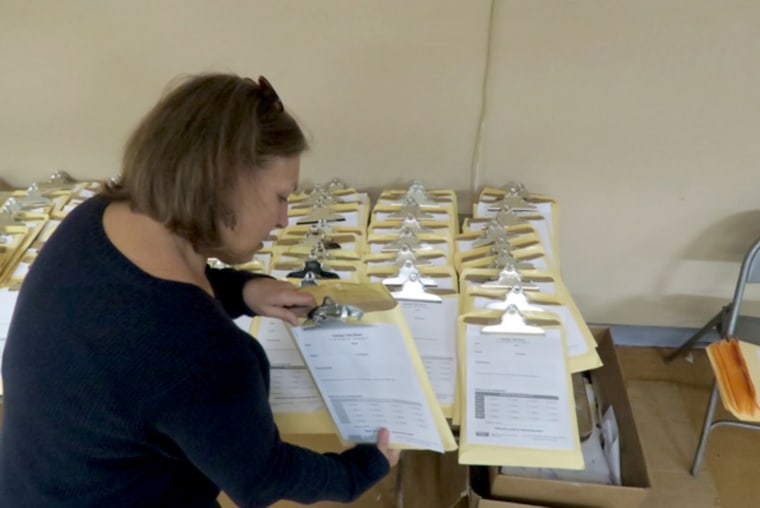PHILADELPHIA — With just hours to go before the polls opened, Jamira Burley floated through the streets of West Philadelphia like a one-woman dervish.
Last-minute volunteers needed training. Phone banks needed manning. Canvassers needed turf sheets and some needed Uber rides to far-flung corners of the ward.
Did that printer get fixed? Was there enough bottled water, coffee or confections for weary door-knockers? That group from Los Angeles — or was it London or Long Island — did they make it to the training?
She’d been operating like this for weeks. Exhausted. Sleepless. Anxious.

But if ever there was a moment to press through the mess — as the old folks like to say — it was this moment right here, T-minus however many hours left until the polls closed and the next president of the United States would be chosen.
“Everything that I’ve done or learned over the last 10 years has prepared me for this moment,” said Burley, 28, the deputy director of millennial outreach for Hillary Clinton’s campaign.
It was game time and the stakes couldn’t be higher. Clinton’s path to the White House could very well run through Pennsylvania, which meant she’d need big turnout in its largest city of Philadelphia. Burley, a West Philadelphia native, heads up the campaign's get-out-the-vote efforts in that part of the city, a heavily black and reliably blue patchwork of neighborhoods. As such, she is also one of the campaign’s not-so-secret weapons aimed at delivering as many of the city’s coveted black votes as possible.
“This is the hardest job I’ve ever had because I care so much about the outcome,” she said, whipping a gleaming white SUV down many of the same streets she grew up on. “I know these people. We’ve shared the same experiences, the same heartache. They see me as a validator. So when I tell them that Hillary Clinton is not just a good, qualified candidate, but someone willing to fight for them, they believe me.”
Related: A Push to Engage Black Millennials Without Obama on the Ballot
President Barack Obama won the state in 2008 and again in 2012, the latter he claimed by about 17 votes per ward — a fact not lost on the staffers and volunteers pounding the pavement during the final hours of the election. Each morning, bus loads of volunteers stream in from across the country. They’re driving in from across the state or marching in from across town.
On the eve of the election, in the half-dozen volunteer centers, located in West Philadelphia, Burley and the campaign team were gearing up for one final push before the big day. The walls at one location on South 52nd Street were lined with affirmations, talking points and marching orders. At the top of the list: any canvasser should be urging voters to make a plan on Election Day, volunteers should listen, be patient and thoughtful. But at the top of the list is one rather direct question: “Can we count on you to vote for HRC?”
Polling data, history, the tenor and tone of this particular election cycle indicates that black voters that cast ballots this election will almost certainly vote for Clinton by a tremendous margin. Trump’s polling among black voters has been near negligible lows. The question will not be for whom African Americans vote for, it’ll be just how many of them will show up to vote.
Obama's slight victory in the state in 2012 has been drummed into each volunteers' head as a reminder not to take a single vote — or door for that matter — for granted.
For almost the entire 2016 election cycle there’s been an ongoing stream of think pieces and punditry on what some analysts perceive as a lack of excitement or an enthusiasm gap among black voters — the most loyal Democratic voters who delivered the first black president two terms in office.
As early voting got underway in recent days, those keeping an eye on black voter turnout anxiously awaited the first data to come out of the South, particularly among battleground states with large black populations. In four such states — Florida, Georgia, Louisiana and North Carolina— all but North Carolina saw increases in early black voting. North Carolina’s early turnout seems to have been dampened not by a lack of enthusiasm but what many, including a federal court, believe was a GOP effort to make voting harder for African Americans.
“This is the hardest job I’ve ever had because I care so much about the outcome."
Dr. Ivory Toldson, a researcher and former Obama appointee, offered a bit of caution and nuance to that narrative. Toldson in a Facebook post last week said the issue with that particular narrative is that the baseline is askew, given the historic and record level of black voter turnout during 2008 and 2012 with the country’s first black president on the ballot.
“We fully expect black voter turnout to regress toward the mean in 2016. There is nothing about this election that should make any independent observer expect anything more or less than normal levels of Black voter turnout,” Toldson wrote.
Black voters have played a pivotal role in Clinton’s campaign from the outset, described early in the primaries as her “firewall,” an impenetrable buffer built on both familiarity and later, an invaluable co-sign from the Obamas.
"I know there are a lot of people in barbershops and beauty salons and in the neighborhoods who are saying to themselves, 'Well, we love Barack, and we especially love Michelle,'" Obama said last week in an interview with the popular African-American radio host Tom Joyner. "And so it was exciting, and now we're not excited."
But Obama lamented the notion of seeing all that he and his administration had built over his two terms in office being torn asunder.
In recent weeks, Democrats have rolled out radio and TV ads aimed at African Americans and hinged on Obama. In one of the ads, the president says:
“All the progress we’ve made is at stake in this election. Tolerance is on the ballot. Ending mass incarceration, that’s on the ballot right now … You want to give me a good sendoff? Go vote!”
Taking Nothing for Granted
If Clinton is to win Pennsylvania, a crucial step on the road to the White House for either candidate, she’ll likely have to do so with a sizeable turnout by African-American voters. Those voters bookend the state mostly, clustered in and around Pittsburgh to the west and Philadelphia to the far eastern part of the state.
“Hillary needs Pennsylvania to win the White House and Philadelphia is going to deliver the votes she needs to win the state,” said Regina Scwartzh, a volunteer and get out the vote expert who previously worked on the Obama campaign. “And voters in this precinct in Philadelphia is going to push her over the top.”
In recent weeks, the Clinton campaign has unleashed a virtual tsunami of canvassers across the Keystone State, focused mainly on areas with high concentration of loyal Democratic black voters.
Related: Despite Sluggish Early Voting, History Shows Black Women 'Show up and Show Out'
This past weekend alone, Clinton canvassers knocked on over 1.3 million doors in 286 neighborhoods across the state, according to the campaign. In the past week, more than 1.18 million phone calls have been made to prospective voters and nearly 3,400 new volunteers have worked a shift over the past week.
In a memo to campaign workers, Hillary for Pennsylvania state director Corey Dukes said the campaign “is running as though we’re 10 points behind," taking absolutely nothing for granted in a state that Donald Trump and his campaign have called a “must win.”

Volunteers on the ground and some experts caution the assertion that black voters aren’t engaged with this election or their candidate of choice.
Susan Haas, another Clinton volunteer, looked puzzled when asked if she’s experienced any reticence on the part of black voters in the overwhelmingly black neighborhoods she’s canvassed in West Philadelphia.
“In a word, determination,” Haas said. “It’s just determination. People know what’s at stake and they are determined to get to the polls and vote."
A Tireless Advocate
Burley and her squad of volunteers spreading out across West Philly said the key to getting folks out to the polls is “lowering all the barriers.” Until Monday, one of those barriers could’ve been transportation. Workers for SEPTA, the city’s mass transit system, had been on strike, which could’ve created havoc in the lives of busy voters who would need to work voting into the logistical tangle of getting the kids off to school and activities and work.
Among that ubiquitous list of "do’s" for volunteers is to urge voters to make a plan on exactly how and when they planned to get to the polls.
For years, beginning during her school days at Overbrook High School, Burley has been a tireless advocate for the city’s most vulnerable.
She’s fought for education reform and against gun violence, the latter of which she’s been touched by personally. At a young age, she watched two of her teenage brothers go on trial for murder. Later, during her sophomore year in high school another of her brothers was fatally shot. That same year, her father was convicted of a separate murder. Other siblings have cycled in and out of jail and prison. Burley went on to become the first of her 15 siblings to graduate high school and attend college. She became a local community leader and eventually graduated from Temple University.
In July, Burley left a position with Amnesty International to join the Clinton campaign. About a month ago she returned home to Philly to organize volunteers and the get-out-the-vote efforts in her old neighborhood.
Related: Eight Black Women Poised to Make History on Election Night
Today, Burley went to the polls with her grandmother, mother, aunt and younger sister to vote. It was her sister’s first time voting.
“I don’t think she ever expected to see a woman president,” Burley said of her grandmother. “To see the first black president and now hopefully the first woman president is amazing.”
If the latter is the case, Burley said, she hopes that extra push from West Philly would have helped seal the deal.
